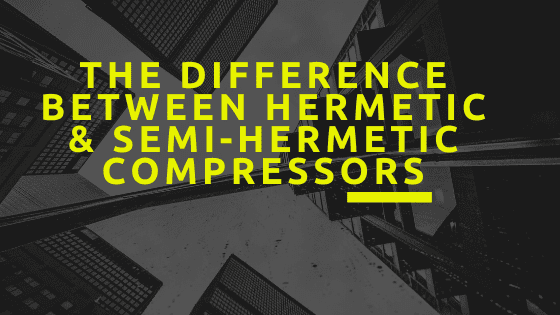 One of the biggest factors that determines whether a commercial or industrial compressor lasts is maintenance. That includes two factors: The actual maintenance needs brought on by the work environment and how easy or difficult it is to perform maintenance on the equipment itself.
One of the biggest factors that determines whether a commercial or industrial compressor lasts is maintenance. That includes two factors: The actual maintenance needs brought on by the work environment and how easy or difficult it is to perform maintenance on the equipment itself.
Early commercial compressors were notoriously difficult to do maintenance on. This would lead to long periods of downtime that aren’t acceptable in today’s work environment. Today’s businesses strive to achieve up-time as close to 100% as possible.
With that in mind, the design of the commercial compressor has changed over the years.
One big division in compressor manufacturing is the divide between the hermetic and semi-hermetic compressor.
Both can be suitable for high-end commercial and industrial applications. But fundamental differences in execution also affect performance, maintenance, and longevity.
An Overview of Hermetic Commercial Compressors
In a hermetic compressor, both the motor and the compressor are located within a single outer welded steel shell. The major performance benefit of a hermetic commercial compressor is that it is effectively leak-proof.
However, that comes with a significant drawback.
Because of the construction of the steel shell and components, it is impossible to perform basic repairs on the hermetic commercial compressor. If the unit fails, then the entire compressor has to be replaced.
Needless to say, this can lead to dramatic and unexpected costs.
Both “hermetic” and “semi-hermetic” refer to the airtight seals used to protect components. The goal is to isolate the main compressor and engine in a safe environment. This prevents the infiltration of dust and other contaminants that interfere with the operation and can make liquid slugging or flooding more likely.
A hermetic compressor often has a low cost of ownership. However, operating noise can be high. Hermetic compressors also tend to suffer greater levels of vibration versus other compressors.
How Long Does a Modern Hermetic Compressor Last?
It’s a good idea to plan for hermetic compressors to last between two and five years. As time goes on, the average service length is growing. Compressors in a low usage environment may easily last five years or more. Your manufacturer or remanufacturer warranty will give you some good clues here.
Maintaining appropriate refrigerant levels and taking other basic preventive steps can extend the life of a hermetic compressor. They mostly respond to working conditions; however, heavy use leads to earlier performance degradation and, ultimately, the breakdown of the unit.
Hermetic commercial compressors were once very common. As time goes on, however, more organizations expect the ability to be proactive about maintenance and how they keep equipment running. Other technologies have improved leak resistance while expanding maintenance.
That leads us to the concept of the semi-hermetic commercial compressor.
About Semi-Hermetic Commercial and Industrial Compressors
The semi-hermetic compressor has been around since the 1940s but has seen some extraordinary improvements over the last few decades. Now in common use, it is designed to address some of the major shortcomings of the hermetic compressor.
In particular, it provides access to many key mechanical parts so they can be repaired rather than replaced if they fail.
Semi-hermetic compressors use a cast iron casing for the essential parts. The motor and compressor are still housed together, but they can be accessed as needed. This enables maintenance checks and repair or replacement of parts as they degrade rather than a total failure of the system.
Both hermetic and semi-hermetic compressors evolved due to the trouble with open compressor architecture, where the engine and primary compressor unit receive very little or no protection.
How Long Will a Semi-Hermetic Commercial Compressor Last?
A semi-hermetic compressor undergoing regular maintenance should be expected to last well over five years, with 8-10 years being common. Compressors that undergo light usage have been known to last up to twenty years, although this is rare.
Originally, semi-hermetic commercial compressors found wide use in large air conditioning systems. Since then, they have also spread to various commercial refrigeration systems. Brands like Bitzer, Trane, and many more use semi-hermetic compressors. You’ll find them with both reciprocating and screw-type compressor models.
Staying Ahead of Semi-Hermetic Compressor Maintenance
For large-scale refrigeration applications, semi-hermetic compressors are the most financially efficient option. That said, maintenance is a crucial part of achieving maximum value from a semi-hermetic compressor. Its operating conditions should be monitored and optimized.
The most advanced compressors today incorporate on-board internal monitoring using a range of sensors, such as the Trane Helirotor. These sensors enable the unit to adjust its performance to changing conditions, maintain service, and alert you to events that occur outside specifications.
There are a variety of tests you can run to ensure your compressor is operating at expected levels. Maintaining a good service agreement with your remanufacturer will also extend your compressor’s service life. That can save your organization many thousands of dollars over a few years.











